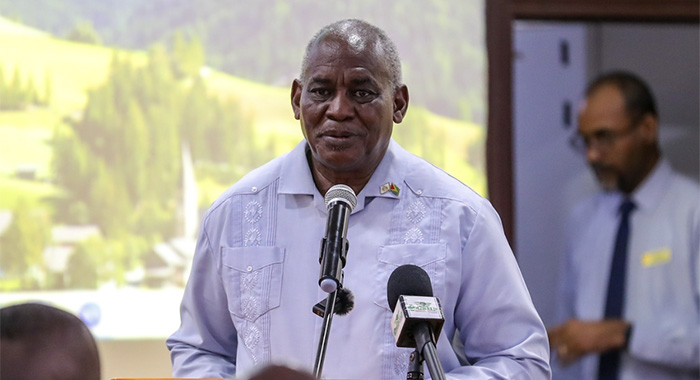GEORGETOWN, Guyana (CMC) — Guyana, Friday, expressed concerns at new efforts by Venezuela to claim the Essequibo region which makes up about two-thirds of the Caribbean Community (CARICOM) country and is home to 125,000 of its 800,000 citizens.
Addressing the opening of the Regional Security System (RSS) Council of Ministers Meeting here, Home Affairs Minister Robeson Benn, said that Caracas, as late as Thursday, had violated the terms of the Joint Declaration of Argyle for Dialogue and Peace between Guyana and Venezuela negotiated in St. Vincent and the Grenadines in December last year.
“I have to say at the moment, we, in Guyana, deplore the avoidance of the Argyle Declaration, which was made where the two principal parties under the supervision and discussion of members of CARICOM … made representations that neither party will do anything which will make the situation worse.
“We deplore, we are unhappy, that the government of Venezuela and its National Assembly just yesterday agreed that they will make Essequibo firmly … Venezuelan territory. This is highly regrettable and it is in violation (of the) principles of the good faith discussions which were undertaken at Argyle and more latterly in Brazil,” said Benn, who is also the outgoing chairman of the Barbados-based RSS.
The Joint Declaration of Argyle for Dialogue and Peace between Guyana and Venezuela said that the two countries agreed that “any controversies” between them would be resolved in accordance with international law, including the Geneva Agreement dated Feb. 17, 1966.
The Joint Declaration of Argyle for Dialogue and Peace between Guyana and Venezuela issued following talks in Kingstown, between President Irfaan Ali and President Nicolas Maduro, over the disputed Essequibo region, also indicated that the two countries agreed that “any controversies” between them will be resolved in accordance with international law, including the Geneva Agreement dated February 17, 1966.
According to the joint declaration, the two leaders said they are committed to the pursuance of good neighbourliness, peaceful coexistence, and the unity of Latin America and the Caribbean.
They noted Guyana’s assertion that it is committed to the process and procedures of the International Court of Justice (ICJ) for the resolution of the border controversy as well as noting Venezuela’s assertion of its lack of consent and lack of recognition of the ICJ and its jurisdiction in the border controversy.
Benn told the meeting that Georgetown insists that the border dispute is a matter that “must be resolved in the courts.
“We, of course, expect that Guyana will be vindicated through that process, but we note the risks; we note the challenges that are in Venezuela and we are concerned about the questions of instability particularly in the presence of non-state actors in eastern Venezuela, particularly on our borders”.
Benn said these non-state actors include “remnants of the FARC, the ELM and others…who are involved in drug trafficking, people trafficking and smuggling of minerals and other things.
“Guyana does not have any designs on Venezuelan territory. Guyana provides support to perhaps more than 30,000 registered Venezuelan persons in her territory. We still view Venezuelans as our cousins.
“There are thousands of Guyanese and their descendants in Venezuela itself and we look forward to their protection in their territory on the similar basis that we, through the government and its agencies and our people themselves, provide to Venezuelan migrants in Guyana.”
Benn said Guyana expects its people to be protected in the South American country, adding, “while we continue to deplore, [we] continue to look forward to reasonable, rational conversation and engagement to make sure that not only the issue between Venezuela and Guyana is mitigated and poses no risk to either territory, but also in the larger context the question of maintaining the CARICOM region as a zone of peace in relation to this issue”.
Benn said he particularly wanted to warn against “the potential for independent action by non-state actors on the borders and in the territory of Venezuela, irrespective of this controversy.
“ A controversy which was dissolved in 1899…. and only came into some issue, when a letter, a tale from the grave suggested that something unusual, unwarranted and improper happen,” he said, adding that Guyana is relying upon the support of its partners “in the region and further afield (like) United States, Canada … and particularly Brazil”.







Venezuela will never rests until it gains possession of this oil-rich reason.
All the Caribbean countries dependent on Venezuelan oil, including our very own SVG, will side with Venezuela against Guyana if there is a violent takeover by the former.
The rest of world will stand by and allow conquest to happen so long as its countries are able to obtain oil from the disputed territory regardless of who controls it.
C.Ben-David that will never happen. The American will intervene to restore the balance.
CARICOM got played its as simple as that people do what is in their strategic interest once they have the political power and military might to do so. Guyana has neither.
The logical response should be a preemptive attack but Guyana lacks the power to pull that off and we have to stand down because we need the subsidized oil.